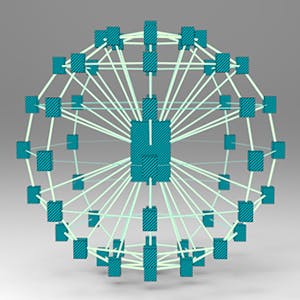Embark on a comprehensive exploration of cloud computing concepts with the Cloud Computing Concepts, Part 1 course. Delve into the core techniques, algorithms, and design philosophies underpinning modern cloud computing systems, whether open-source or utilized within organizations. This course equips you with a profound understanding of distributed systems and their relevance to cloud computing, covering a wide array of concepts from Clouds and MapReduce to key-value/NoSQL stores, classical and widely-used distributed algorithms, scalability, and trending areas in the field.
Throughout the course, you will engage in hands-on exercises and programming assignments in C++ to implement and solidify your understanding of these concepts. Additionally, gain insightful perspectives from leading researchers and managers in the industry and academia through exclusive interviews.
Certificate Available ✔
Get Started / More Info
Cloud Computing Concepts, Part 1 offers a comprehensive exploration of core distributed computing concepts for cloud computing, covering topics such as Clouds, MapReduce, key-value/NoSQL stores, classical and widely-used distributed algorithms, scalability, and trending areas.
Week 1 provides an orientation to cloud computing concepts, delving into the history, economics, and new aspects of clouds. Additionally, it covers the fundamental distributed system concept and introduces the MapReduce paradigm, scheduling, and fault-tolerance. The module also includes interviews with industry experts, providing valuable insights into the field.
Week 2 explores gossip, membership, and grids in the context of distributed systems. It delves into the multicast problem, the gossip protocol, group membership lists, failure detectors, and grid applications and infrastructure. The module also features an interview with an expert in the field, offering exclusive perspectives on the covered topics.
Week 3 focuses on peer-to-peer (P2P) systems, covering the introduction to P2P systems, along with specific examples such as Napster, Gnutella, FastTrack, BitTorrent, Chord, Pastry, and Kelips. Additionally, it features insights into the Blue Waters Supercomputer, providing a real-world perspective on the application of P2P systems.
Week 4 delves into key-value stores, time, and ordering in distributed systems, covering the rationale behind key-value/NoSQL, specific implementations such as Cassandra and HBase, and the principles of time and ordering. The module also includes an interview with an expert in the field, providing valuable insights into the covered topics.
Week 5 focuses on classical distributed algorithms, exploring global snapshot, multicast ordering, reliable multicast, virtual synchrony, the consensus problem, and specific algorithms like Paxos. The module also includes a conclusion to the course, preparing learners for the final exam and offering a space for reflection on the course experience.
Artificial Intelligence: an Overview is a comprehensive Specialization for beginners, covering technical groundings in AI, ethical and legal issues, and the future...
Mind and Machine is a specialized study of the intersection between human cognition and artificial intelligence, exploring the historical arc and current research...
Inteligencia artificial: proyecto final
This course on Visual Perception delves into the core principles of computer vision, covering object tracking, image segmentation, appearance matching, and neural...